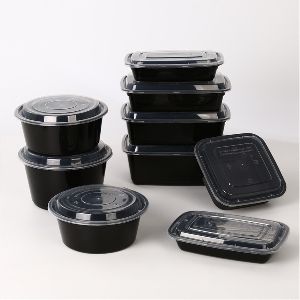
In today’s fast-paced world, ordering food online has become a daily habit for many Indians. The convenience of food delivery apps means we often receive our meals packed in black plastic containers. But have you ever wondered what happens when hot food sits in these plastic boxes for too long?
The Hidden Dangers of Black Plastic Boxes
Most black plastic containers used in food packaging are made from recycled plastic and may contain toxic chemicals, heavy metals, and carcinogenic substances. When exposed to heat, these toxins leach into your food, slowly harming your health. Here’s why you should be alarmed:
🔴 May Develop Cancer – Studies have shown that plastic toxins like bisphenol A (BPA), phthalates, and styrene can mimic hormones, potentially triggering the growth of cancer cells.
🟠 Poor Gut Health & Weakened Immunity – Constant exposure to microplastics and chemicals affects gut microbiota, leading to digestive issues, inflammation, and lowered immunity.
🟠 Linked to Thyroid & PCOD Issues – Endocrine-disrupting chemicals in plastics interfere with hormone function, contributing to thyroid disorders, PCOS (Polycystic Ovarian Syndrome), and metabolic imbalances—all of which are rising alarmingly in India.
🟠 Affects Children’s Brain Development – Phthalates and lead found in certain plastics affect cognitive development, memory, and learning ability in children. India is already seeing a rise in neurodevelopmental disorders among kids, and plastic toxins could be a hidden factor.
🔴 Causes Infertility in Men & Women – Plastics release endocrine disruptors that lower sperm count in men and impact egg quality in women, contributing to the rising infertility rates in India.
Recent Alarming Trends in India
- India’s Infertility Rate is Rising: A 2023 study found that 1 in 6 couples in urban India faces fertility issues, with environmental toxins being a major contributor.
- Gut Health Disorders Are Increasing: The rise in IBS, acidity, and bloating cases among young Indians is linked to processed foods and chemical-laden packaging.
- PCOD is Now Affecting Teenagers: Reports suggest that 1 in 5 Indian women suffers from PCOS, with hormone disruptors playing a significant role.
- Thyroid Disorders Are Common: Many thyroid patients in India are plastic-related toxins that could be worsening the issue.
These boxes are commonly used in food delivery and have higher risks due to:
- Toxic Chemicals & Carcinogens – The black color is created by adding a substance called carbon black to the plastic. Carbon black which contains numerous compounds, some of which like polycyclic aromatic hydrocarbons (PAHs) have carcinogenic properties.
- Can’t be Recycled – Although black plastic makes up 15% of all plastic recyclables (largely single-use food containers), the vast majority is not recycled because the technology used by recycling facilities to sort plastics cannot “see” the color black.
- Higher Migration Levels – When exposed to heat (like hot food or microwaving) these chemical-laced plastics are melted down, mixed with food grade plastics, can release harmful compounds, affecting gut health, immunity, and brain development in kids.
What Can We Do? (Safer Alternatives & Solutions)
✅ Opt for Restaurants Using Sustainable Packaging – Many eco-conscious brands now use biodegradable, glass, or steel containers. Prefer ordering from them!
✅ Carry Your Own Reusable Container – When picking up food, take your own stainless steel box to avoid unnecessary plastic exposure.
✅ Educate Others: Raise awareness about the dangers of black plastic containers and the importance of choosing safer alternatives.
✅ Think Again: Get rid of any plastic cooking utensils in your kitchen. Stick to wood or stainless steel.
FSSAI on Black Plastic Containers:
The Food Safety and Standards Authority of India (FSSAI) has raised concerns over the use of black plastic containers in food packaging, especially for hot and oily foods. The Food Safety and Standards (It) Regulations, 2018 state that all packaging materials—especially those made of plastic—must follow certain migration limitations to prevent dangerous compounds from leaking into food. According to the rules, plastics meant for food contact must not have an overall migration limit of 60 mg/kg or 10 mg/dm2, as determined by testing accordance with IS 9845 criteria.
Additionally, the FSSAI forbids the packing, storing, transporting, or dispensing of food items using recycled plastics, including carry bags. The goal of this precaution is to avoid possible contamination from recycled materials. Due to the possibility of chemical contamination from inks and dyes, the regulations also prohibit the use of newspapers and comparable materials for food packaging or wrapping.
Choosing food that is packaged according to FSSAI guidelines can greatly lower the chance of coming into contact with dangerous materials. Customers can significantly contribute to maintaining food safety and promoting environmentally friendly packaging methods in the food business by being informed and making thoughtful decisions.

Concluding Remarks : You Control your Health
Concluding Remarks: You Control Your Health!
India’s food delivery market is expanding, but we need to insist on healthier packing options. You and your loved ones can avoid serious health hazards by making tiny but thoughtful decisions.
Say YES to a healthier future and NO to black plastic packaging!
What do you think about this matter? Have you made any action to steer clear of plastic packaging? Let’s talk about it in the comments! 🚫🍱♻️
